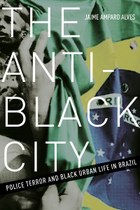Antipode: The Anti-Black City
 I read The Anti-Black City in the direct aftermath of the brutal slaying of Marielle Franco, a queer black activist and city councilor in Rio de Janeiro. Preliminary evidence suggests that she and her driver, Anderson Gomes, were targeted by state actors because of Franco’s tireless work denouncing the police killings of black, working class people in Rio’s favelas. The murders have cast a(nother) dark shadow over Brazil’s international image, momentarily making globally visible what has long been a structural foundation of Brazilian cities: acts of total violence against peoples of the African diaspora.
I read The Anti-Black City in the direct aftermath of the brutal slaying of Marielle Franco, a queer black activist and city councilor in Rio de Janeiro. Preliminary evidence suggests that she and her driver, Anderson Gomes, were targeted by state actors because of Franco’s tireless work denouncing the police killings of black, working class people in Rio’s favelas. The murders have cast a(nother) dark shadow over Brazil’s international image, momentarily making globally visible what has long been a structural foundation of Brazilian cities: acts of total violence against peoples of the African diaspora.
Jaime Amparo Alves’s book is a tragically timely contribution to this hypervisibility of violence in Brazil. While the setting is São Paulo, not Rio de Janeiro, his theoretically grounded ethnography points to similar logics of necropolitical urban violence. Alves’ project is to interrogate how the state produces “geographies of death and privilege” as a spatialized and racialized regime of governance in the contemporary neoliberal Brazilian city (p.2). The book poses two central questions: “What are the spatio-social practices that enable the (re)production of the city’s racial order?” and “What kind of political action is required for turning the city of death into a blackopolis, a place for a radical repositioning of black life vis-à-vis violence and victimization?” (p.4). Alves spends most of the book answering the first: each chapter focuses on a different grouping of spatio-social practices that produce the city as a racialized bio(necro)polis, from highly spectacular killings by the police in favelas, to mass incarceration, to black mothers fighting state bureaucracy.
By: Carolyn Prouse
Story Date: 2018-06-15T05:00:00+00:00



